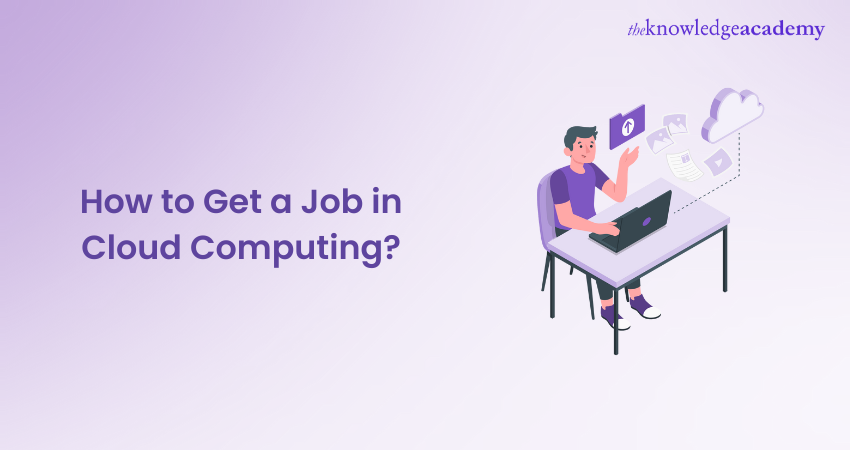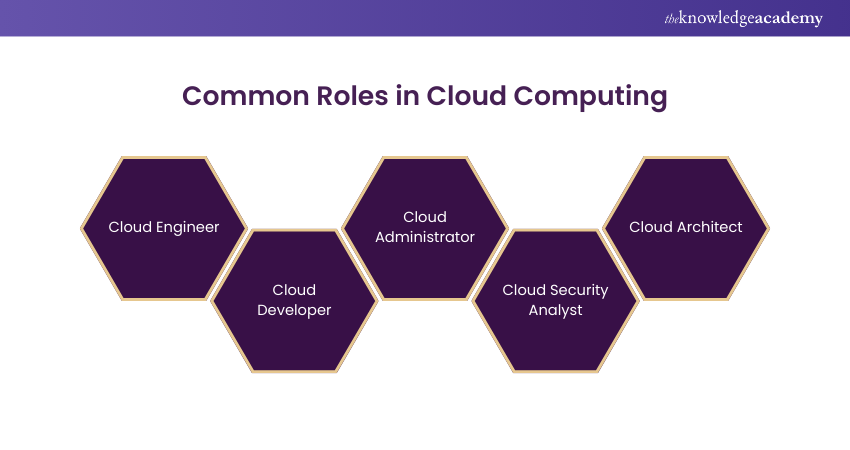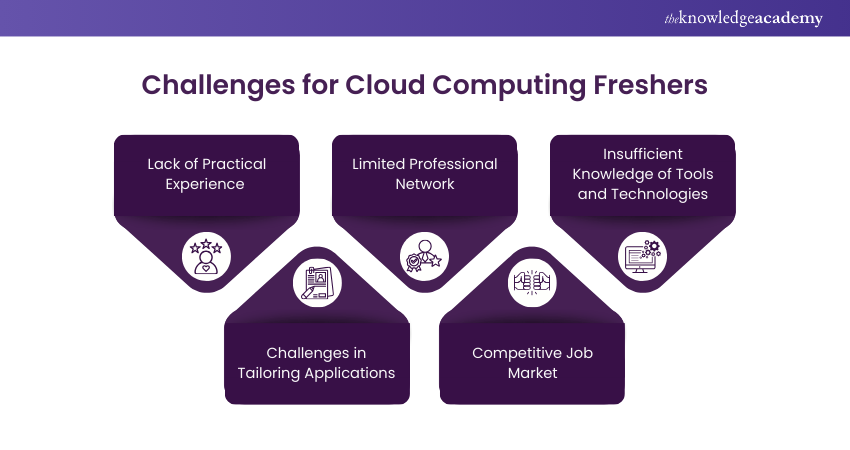We may not have the course you’re looking for. If you enquire or give us a call on 01344203999 and speak to our training experts, we may still be able to help with your training requirements.
We ensure quality, budget-alignment, and timely delivery by our expert instructors.

Like many entry-level positions, breaking into the Cloud Computing job market can be daunting. Many aspiring job seekers often end up asking: How to Get a Job in Cloud Computing? It's a classic catch-22 situation, where you're required to have the experience to secure a job. While this may seem like an impossible barrier, the reality is quite the opposite.
Initiating a career in Cloud Computing is not only possible but also highly feasible, even if you lack prior professional or academic experience or don't come from a technical background. So, if you are someone asking the same question, we have got you covered.
This blog explores How to Get a Job in Cloud Computing by shedding light on the essential skills and certifications you need and, most importantly, you can easily acquire. Read on and secure your dream career.
Table of contents
1) What is Cloud Computing?
2) What Does a Job in Cloud Computing Entail?
3) Understand How to Get a Job in Cloud Computing
a) Master the Skills Required for Cloud Computing Jobs
b) Fulfil the Educational Requirements
c) Gain Practical Experience
d) Craft an Impressive Resume
e) Prepare for Cloud Computing Interviews
f) Tailoring Applications for Different Roles
g) Stay Updated with Industry Trends
4) Overcoming Challenges for Freshers in Cloud Computing
5) Conclusion
What is Cloud Computing?
Cloud Computing refers to the on-demand access to computing resources over the internet, including storage, processing power, and applications. Cloud Computing Statistics show a growing trend in businesses shifting from owning physical servers to utilising these resources from Cloud Service providers as needed.
The key features of Cloud Computing include:
1) Scalability: Resources can be easily adjusted to match demand. Whether you need more storage or processing power, the cloud can scale up or down as needed.
2) Cost-Effectiveness: With Cloud Services, you pay only for what you use. This pay-as-you-go model can be significantly more cost-effective than maintaining your own infrastructure.
3) Accessibility: Cloud resources are accessible from anywhere with an internet connection. You don’t have to be tied to a specific physical location.
4) Flexibility: Cloud Computing offers various service models including:
a) Platform as a Service (PaaS): Offers a platform for developing and deploying applications.
b) Infrastructure as a Service (IaaS): Provides virtualised computing resources (servers, storage, networking).
c) Software as a Service (SaaS): Delivers software applications over the internet.
What Does a Job in Cloud Computing Entail?
As a Cloud Computing professional, you will be tasked with handling every technical aspect related to the cloud, aiming to transform IT processes within a business. Some of the most common Cloud roles include:

1) Cloud Engineer: A Cloud Engineer is a broad term for professionals who hold various roles, such as Cloud Security Engineer or Cloud Software Engineer. They handle all Cloud-related duties, including design, planning, development and maintenance.
2) Cloud Developer: Like Software Engineers, Cloud Developers build software applications that run on the cloud.
3) Cloud Administrator: In Cloud Administration, you provide technical support and cloud-based solutions across hardware and software. You are also typically responsible for migrating businesses from local infrastructure to the cloud.
4) Cloud Security Analyst: A Cloud Security Analyst conducts risk assessments to ensure cloud environments are secure from breaches and compliant with regulations.
5) Cloud Architect: As a Cloud Architect, you will be overseeing a company’s Cloud strategy, including how the Cloud is designed, adopted, and managed.
Ready take your Cloud Technology expertise to the next level? Sign up for our Certified Artificial Intelligence (AI) For Cloud Professionals Training now!
Understand How to Get a Job in Cloud Computing
As businesses increasingly migrate their operations to Cloud Platforms, the demand for skilled professionals is soaring. If you aspire to embark on a career in Cloud Computing, it's essential to understand the essential steps that can make the way to success. So, let’s see How to Get a Job in Cloud Computing through this step-by-step guide:
Fulfil the Educational Requirements
While Cloud Computing is known for its inclusivity regarding educational backgrounds, having a relevant degree can significantly enhance your prospects. A Bachelor's/Master's degree in domains like Computer Science, Information Technology (IT), or any related field is often preferred by employers.
In addition to obtaining formal education, acquiring certifications in popular Cloud Platforms can add a competitive edge to your profile. These certifications validate your skills and demonstrate a commitment to continuous learning. These certifications include:
a) Amazon Web Services (AWS): This leading certification comes in four levels – Foundational, Associate, Professional and Specialty.
b) Microsoft Azure: This certification is categorised into three levels – Fundamental, Associate and Expert.
c) Google Cloud Platform: This certification comes in the Foundational, Associate and Professional levels.
The dynamic nature of Cloud Computing demands a commitment to continuous learning. Stay updated with industry advancements by attending workshops and webinars and undertaking relevant online courses. Showcase your commitment to learning in your resume.
1) Master the Skills Required for Cloud Computing jobs
From Cloud Architects to System Administrators, each role demands a specific set of skills. So, research and identify the skills relevant to your desired position. The following are some key skills that you need to possess:
1) Develop a solid foundation in programming languages such as Python, Java, and C++.
2) Familiarise yourself with Cloud platforms like AWS, Azure, and Google Cloud.
3) Acquire expertise in areas such as virtualisation, networking, and security to demonstrate a comprehensive skill set.
In addition to technical capabilities, employers value soft skills. Effective communication, problem-solving, and teamwork are integral to succeeding in a Cloud Computing role. Cultivate these skills to complement your technical abilities.
2) Gain Practical Experience
Practical experience is a cornerstone of success in the field of Cloud Computing. Employers often seek candidates with hands-on knowledge of Cloud platforms and technologies. Pursuing internships, entry-level positions, or engaging in personal projects provides valuable practical experience.
Moreover, you can consider contributing to open-source projects or creating your own initiatives to showcase your abilities. Practical experience not only enhances your skill set but also demonstrates your initiative and problem-solving capabilities to potential employers.
Ready to kickstart your Cloud Computing journey? Explore our Cloud Computing Training today!
3) Expand your Reach
Expand your reach if you are new to the Cloud or looking to switch careers to Cloud Computing. Networking is essential in building your Cloud Computing career, especially if you are a beginner. You can interact with many like-minded people with expertise in your field through networking.
They will also guide you in finding the best training and contacts who can help you seek out jobs. Moreover, expanding your network acts as a reference when you apply for jobs.
4) Tailor Applications for Different Roles
Avoid the one-size-fits-all approach when applying for Cloud Computing roles. Tailor your applications, including your CV and cover letter, for each position you apply to. Research the specific requirements and responsibilities of each role and customise your application to highlight your relevant skills and experiences. This attention to detail demonstrates your genuine interest in the position and can make your application stand out among others.
For candidates with limited experience, emphasise transferable skills gained from education, personal projects, or non-tech roles. Also, showcase adaptability, a willingness to learn, and any relevant coursework that demonstrates your potential.
Ready to ride the Cloud wave? Dive into the world of Cloud Computing cosmos with our Cloud Computing Courses – Sign up now!
5) Stay Updated with Industry Trends
Cloud Computing is a dynamic field, with technologies and trends evolving rapidly. Stay updated about the latest Cloud industry trends by following reputable blogs, attending webinars, and participating in online communities.
Also, subscribe to newsletters and join forums where professionals discuss emerging technologies and best practices. Build a professional presence online through platforms like LinkedIn. Connect with industry professionals, participate in relevant groups, and engage in discussions. Networking can provide insights into industry trends and potential job opportunities.
Continuous learning and staying updated with industry trends not only improve your knowledge but also demonstrate your commitment to being an asset in the ever-changing domain of Cloud Computing.
Overcoming Challenges for Freshers in Cloud Computing
Embarking on a career in Cloud Computing as a fresher can be both extremely challenging. While this industry offers immense opportunities, breaking into it without prior experience poses unique hurdles. Here's a closer look at some common challenges faced by freshers entering the Cloud Computing domain and strategies to overcome them:

1) Lack of Practical Experience: Highlight transferable skills gained through coursework, personal projects, or internships. Showcase adaptability and a willingness to learn quickly.
2) Limited Professional Network: Actively participate in online communities related to Cloud Computing. Attend industry events and leverage platforms like LinkedIn for networking. Seek mentorship from already established professionals in the industry.
3) Insufficient Knowledge of Tools and Technologies: Invest time in self-learning and practical experimentation. Undertake personal Cloud projects and contribute to open-source initiatives. Pursue relevant certifications to improve your knowledge and skill set.
4) Challenges in Tailoring Applications: Conduct meticulous research into the specific role and company. Align your skills with the job description to demonstrate a strong fit. Emphasise how your unique attributes make you a suitable candidate.
5) Competitive Job Market: Build a strong online presence through platforms like GitHub. Portray your projects and contributions to stand out from the rest. Continuously refine your skills based on current industry trends.
Conclusion
When it comes to Cloud Computing jobs, you have different paths to choose from when learning how to get a job in Cloud Computing. You can go to college, join a coding boot camp, or learn on your own using online courses. The important thing is to do practical projects that show what you can do. These projects prove you know your stuff and are excited to be part of this growing tech field, which offers some of the high paying jobs in tech. which will also help you prepare for Cloud Engineer Interview Questions that assess your hands-on skills and cloud expertise.
Unleash the power of Terraform in Cloud Computing and elevate your skills with our Terraform Training - Sign up now!
Frequently Asked Questions
Can you get a Cloud job With no Experience?

You can get a Cloud job with no prior job experience. However, you will need certifications such as AWS, Microsoft Azure, and Google Cloud Platform.
Which Pays More, Cloud or Cyber Security?

It depends on factors such as location, company and individual qualifications. With the uptick in remote working, Cloud Computing is neck-on-neck with Cuber security in terms of pay.
What are the other resources and offers provided by The Knowledge Academy?

The Knowledge Academy takes global learning to new heights, offering over 3,000 online courses across 490+ locations in 190+ countries. This expansive reach ensures accessibility and convenience for learners worldwide.
Alongside our diverse Online Course Catalogue, encompassing 19 major categories, we go the extra mile by providing a plethora of free educational Online Resources like News updates, Blogs, videos, webinars, and interview questions. Tailoring learning experiences further, professionals can maximise value with customisable Course Bundles of TKA.
What is Knowledge Pass, and how does it work?

The Knowledge Academy’s Knowledge Pass, a prepaid voucher, adds another layer of flexibility, allowing course bookings over a 12-month period. Join us on a journey where education knows no bounds.
What are related Cloud Computing courses and blogs provided by The Knowledge Academy?

The Knowledge Academy offers various Cloud Computing courses, including Terraform Training, Cloud Computing and Microservices Architecture Training. These courses cater to different skill levels, providing comprehensive insights into Cloud Engineer skills.
Our Cloud Computing Blogs covers a range of topics related to Cloud Technology, offering valuable resources, best practices, and industry insights. Whether you are a beginner or looking to advance your Cloud Computing skills, The Knowledge Academy's diverse courses and informative blogs have you covered.
Upcoming Cloud Computing Resources Batches & Dates
Date
 Cloud Computing Training
Cloud Computing Training
Thu 10th Apr 2025
Thu 12th Jun 2025
Thu 14th Aug 2025
Thu 9th Oct 2025
Thu 11th Dec 2025






 Top Rated Course
Top Rated Course



 If you wish to make any changes to your course, please
If you wish to make any changes to your course, please


